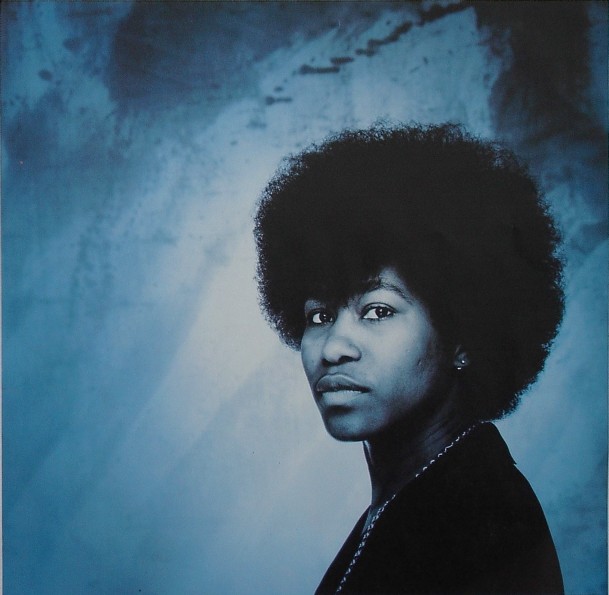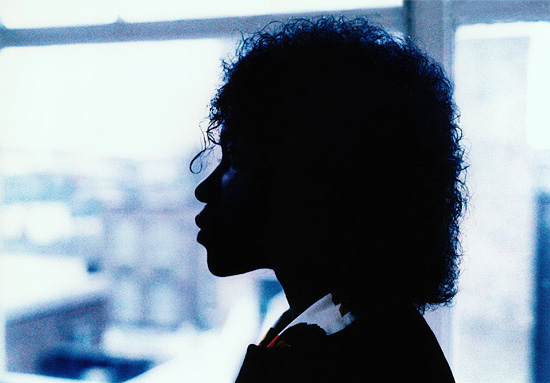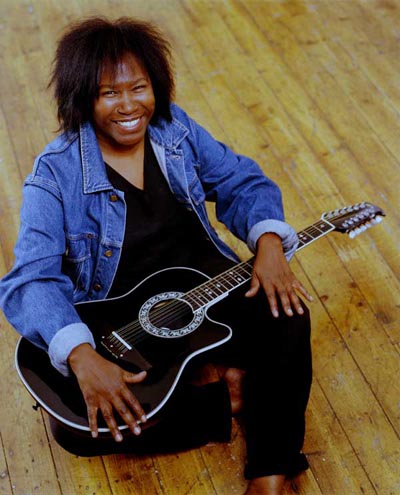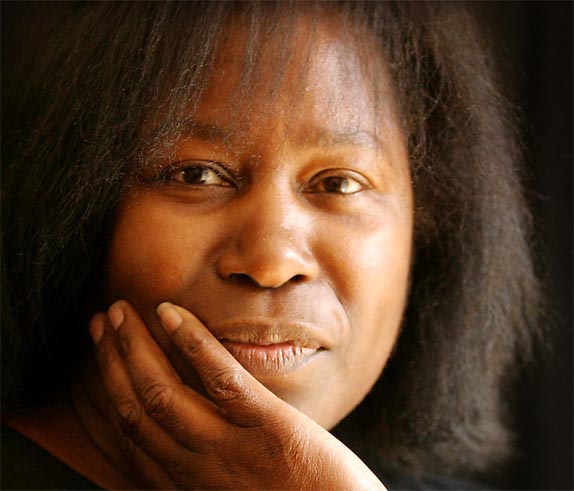JOAN ARMATRADING / “Tall In The Saddle” (Live Version)
I've always written in a free, unencumbered way. I've written what and when I want to. It's been about expressing myself.
—Joan Armatrading
Most people name their first album after themselves, but the British (St. Kitts-born) singer-songwriter Joan Armatrading deigned to go the eponymous route until her third release. Maybe it was because she felt she’d finally found her voice. Not that she wasn’t dropping gems before 1976, the year the Joan Armatrading LP came out. Songs like “Travel So Far,” “Cool Blue Stole My Heart” and the superlative “Let’s Go Dancing” (from 1975’s Back To The Night) and “It Could Have Been Better” and “Whatever’s For Us” (from her 1972 debut Whatever’s For Us) are among the best she’s ever written. But with the Joan Armatrading album, Joan acquired the artistic consistency that had eluded her previously. In nearly 45 minutes, Joan and her band strike not even a single bad note. In the Seventies, it was commonplace for even better artists to include three or four songs (or more) of, frankly, well, crap. I guess the point was to round the album out so that people wouldn’t feel cheated by getting only six or seven songs. But not here. Of these 10 songs, not one sounds even close to ‘filler.’
The best-known of these songs is “Love And Affection,” a Top 10 UK hit for which Joan graces us with one of the best opening lines in the history of opening lines: “I am not in love,” she says, “But I’m open to persuasion.” “Down To Zero,” “Save Me,” and “Somebody Who Loves You” are three more ballad-paced takes on the downside of romantic love, but each is distinguished by Joan’s outstanding sense of melody and harmony, as well as her incisive and detailed lyrics. During this stage of her career, Joan’s lyrics were often so well-written that they read like poetry, as in these lines from “Somebody Who Loves You.” (Note that Joan usually doesn’t bother to rhyme; but her songwriting is so strong, that you never miss it):
Cozy-corner your arms around you
So tired of one-night stands
Left with longing from misspent passion
With one more human to despise
You’ve got somebody who loves you
Don’t mine for gold in the dim-lit cafés
And, as the gypsy once foretold
Love is dark, but no stranger
Mistaken shyness can be costly
Too hasty a goodbye and then you’ve lost me
You’ve got someone who loves you…
The Armatrading album isn’t all love songs. “Join The Boys” is Joan’s ‘band on the road’ song (“We’ll be dancing in the flood lights / Second-to-none not even on a bad night”) and “People” is a sarcasm-laden (“People all around me / In love, in pain / Some are integrated / Driving me insane”) ode to aloneness, though not loneliness. (As Greta Garbo famously reminded us, if you’re alone because you want to be, you ain’t lonely.) But perhaps the most remarkable (if not the best) song of the Armatrading album is the album closer, “Tall In The Saddle.” In concert, Joan sometimes dedicated this song to men who consider themselves “God’s gift to women.” Throughout, her tone is as scathing as her writer’s wit is sharp. Halfway through, there’s a guitar solo to die for and then the tune breaks into a soaring shuffle-stomp as Joan wails away: “We had fun, fun, fun, fun / We had fun while it lasted.”
With this collection of songs, Joan hit her stride, entering a Wonder-esque stretch of six consecutive great albums that lasted through 1981’s Walk Under Ladders. Although she went through a weird rock period in the Eighties during which she seemed to forget how to write a hook, by the end of the decade she came back strong with 1988’s The Shouting Stage and 1990’s Hearts And Flowers. Joan is now in her fourth decade of music-making and through the majority of it, she’s been operating at a superlative level. If you’ve never heard Joan’s music, there’s a whole treasure trove of great songs out there waiting for you. If you’re ready to start listening, the Joan Armatrading album is a perfect place to start.
—Mtume ya Salaam
A musical treasure
Mtume, I think you’ll go for this: I’m switching your feature track from the original studio version to the live version taken from a 1979 concert that was only released as an import LP, although selected tracks are available on the two versions of Love & Affection, which itself is a 2CD compilation that comes in two different pressings that have radically different selections, hence, Armatrading freaks like me have to have both editions. Anyway the live concert recording Steppin' Out is a high-point in Joan’s early career. 
You focus on Joan as a songwriter and I’d like to ditto and deepen that view. With Joan Armatrading we are off into the outer fringes of Black music. In fact, the awesome afro notwithstanding, for most of her career Joan has not been considered a “Black” artist. First, she has chosen to do pop music. Second, she seldom makes any racial references in her music (“How Cruel” with its reference that some people say she’s way too black and some people say that she’s not black enough, is the most notable exception). Third, over the years, all of her regular band members have been whites. And fourth, despite the fact that she writes intimate, personal mini-epics, Joan is a fiercely private person. However, all of those caveats notwithstanding, what Joan does is in line with the strain of black music that is overtly non-racial. Think of say, Johnny Mathis or late period Nat King Cole.
What is really interesting about Armatrading is that though she chose to delve into pop music, she is resolutely anti-establishment in her aesthetic. She is undoubtedly the most radical in her stylistic approaches to writing pop.
Mtume, you mentioned that she avoids rhymes. I don’t think she even thinks about rhyming or not rhyming. I think she writes cinematically and offers us these mini-portraits that are more than snapshots in that there is often a deep narrative with character development, conflict and resolution, sometimes all in one or two lines. She is a truly amazing poet. But more than a wordsmith, she is also great at writing melodies and has a slightly off-kilter sense of harmony that enables her to offer up three-minute songs that are mini-symphonies in their movement and meaning. 
Like a fine, dry wine, Joan Armatrading is not to everyone’s taste—there’s not enough sweetness there to satisfy consumers addicted to sugar. That Joan has stayed the course of crafting serious music within the genre of pop is a testament to her strength and perseverance. For example she has never recorded other people’s music, never covered a pop hit, never even tried to write in the popular style. There is something wonderfully obstinate and contrarian about Joan’s passion for her art. Though she may never be a mega-selling artist, she is a truly a mega-artist.
Joan’s body of songs are deep draughts of mineral-rich well water. Bracing tonics that contain all those trace elements that make her work both distinctive and distinguished.
One of my favorite is her composition “More Than One Kind Of Love,” which is self-explanatory. The anthem of friendship is taken from her 1990 release Hearts And Flowers. This is but a taste of the musical treasure known as Joan Armatrading.
—Kalamu ya Salaam
Cuts to the core
In addition to her many other qualities as a musician in general and as a songwriter specifically, it occurs to me that Joan is a fierce logician...a master of the persuasive argument. The last tune Kalamu mentions, "More Than One Kind Of Love," is a wonderful assertion of the importance of platonic friendship. The lines "Just remember that passion fades / Good friendship seldom dies" and "The body needs love / But there is more than one kind" say all there is to say about the subject. The point is made. Now let's rewind two decades. In her signature tune, "Love And Affection," Joan argues beautifully and effectively for the power of romantic love, as opposed to friendship. She writes: "With a friend, I can smile / But with a lover, I can hold my head back and really laugh." Then she addresses her friend directly, saying, "Thank you / You took me dancing... / But with a lover, I could really move." One could argue that Joan's changing attitude regarding love and friendship was due, at least in part, to the inevitable maturity that comes with two decades of ups and downs, highs and lows, ins and outs. Or, it may be that both of Joan's arguments are true, and equally so. Romantic love is something that the modern human animal feels much more intensely than even the best of friendships. Yet, Joan reminds us, practically warns us, there is more than one kind of love. And, should we "neglect those we know" in favor of pouring all of our favor into one specific romance, we do it at the risk of ending up alone...and lonely. (I added that last bit for the Garbo fans out there.)
It occurs to me too, that although Joan is capable of making quality logical arguments, she is just as capable of explicating the wonder of human contradiction. Her cheating songs, to give just one example, are among the best of their kind because Joan is both capable enough and willing enough to embrace the contradiction inherent in betraying someone you love. In both "The Weakness In Me" and "I Really Must Be Going" (a song from Joan's superlative 1979 EP How Cruel), the protagonist cheats not because they've fallen out of love with their intended, but in spite of their full awareness that they remain in love. Joan begins "I Really Must Be Going" with her characteristic combination of bluntness and subtelty, a combination that leaves us with no doubt as to where the two characters are headed: "Told me that you loved me / You've been looking for me all your life / Told you I was married / You said 'Baby, it don't seem right.'" In "Weakness In Me," Joan expresses the contradiction this way: "I have a lover who loves me / How could I break such a heart?" And yet we do.
To me, it is characteristics such as these (logic and contradiction) that separate Joan's writing from the writing of so many similar artists. Joan's best songs have the distinct ring of truth. Joan expertly fractures our experiences, creating shards of emotion and philosophy that cut to the core. And, Joan is real. She doesn't wallow in the overblown or the hyperbolic. Despite the fantastic situations in which Joan's characters sometimes find themselves, each Joan Armatrading song sounds like the sort of thing that, if it didn't actually happen, could've.
—Mtume ya Salaam
This entry was posted on Sunday, April 30th, 2006 at 12:13 am and is filed under Classic. You can follow any responses to this entry through the RSS 2.0 feed. You can leave a response, or trackback from your own site.
4 Responses to “JOAN ARMATRADING / “Tall In The Saddle” (Live Version)”
May 1st, 2006 at 10:57 am
Teach, teach, teach. I be listenin tuh what appeals to me (and Armatrading does) but listenin tuh what yall both saying helps me understand/know how n why. Thanks so much.
May 2nd, 2006 at 4:41 pm
JOAN! Joan! JOAN! Joan! JOAN! Joan! JOAN! Joan! JOAN! Joan!
I love JOAN ARMATRADING for all the reasons you both listed above. Cinematic. Symphonic. Deep. Earthy. Poetic. Emotional. Incisive. Persuasive.
I am deeply in love (and I am NOT doing my school work… thanks to both of you!)
May 6th, 2006 at 7:21 pm
I was talking today, on the phone, with an old friend, a once lover, in a land quite distant. She heard me share some stories of women friends of mine who now live in many faraway places. She asked, with all your women friends, how is your lover ever to know that she is special, that she in not simply one of many? I could only reply, there is more than one kind of love. I never heard this song from Joan. I haven’t listened enough to Joan. Now I am. Thank you.
Leave a Reply
| top |